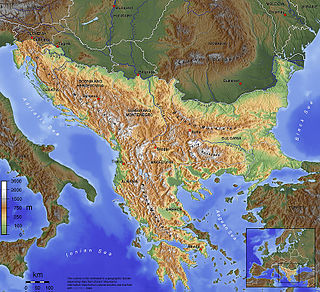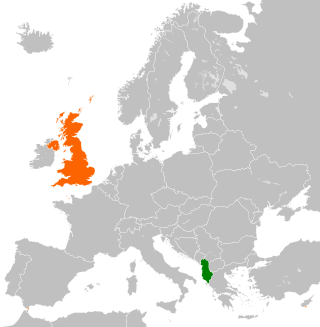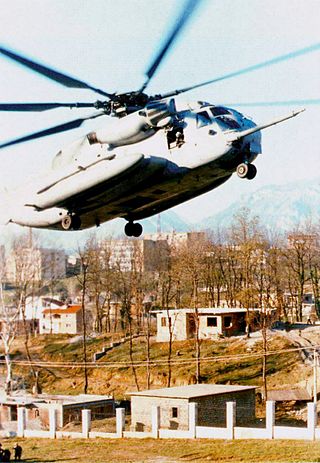
The member states of the United Nations comprise 193 sovereign states. The United Nations (UN) is the world's largest intergovernmental organization. All members have equal representation in the UN General Assembly.

The United Nations Interim Administration Mission in Kosovo is the officially mandated mission of the United Nations in Kosovo. The UNMIK describes its mandate as being to "help the United Nations Security Council achieve an overall objective, namely, to ensure conditions for a peaceful and normal life for all inhabitants of Kosovo and advance regional stability in the Western Balkans."

The United Nations Truce Supervision Organization (UNTSO) is an organization founded on 29 May 1948 for peacekeeping in the Middle East. Established amidst the 1948 Arab–Israeli War, its primary task was initially to provide the military command structure to the peacekeeping forces in the Middle East to enable the peacekeepers to observe and maintain the ceasefire, and in assisting the parties to the Armistice Agreements in the supervision of the application and observance of the terms of those Agreements. The organization's structure and role has evolved over time as a result of the various conflicts in the region and at times UNTSO personnel have been used to rapidly deploy to other areas of the Middle East in support of other United Nations operations. The command structure of the UNTSO was maintained to cover the later peacekeeping organisations of the United Nations Disengagement Observer Force (UNDOF) and the United Nations Interim Force in Lebanon (UNIFIL) to which UNTSO continues to provide military observers.
The political status of Kosovo, also known as the Kosovo question, is the subject of a long-running political and territorial dispute between the Serbian government and the Government of Kosovo, stemming from the breakup of Yugoslavia (1991–92) and the ensuing Kosovo War (1998–99). In 1999, the administration of the Autonomous Province of Kosovo and Metohija was handed on an interim basis to the United Nations under the terms of UNSCR 1244 which ended the Kosovo conflict of that year. That resolution reaffirmed the territorial integrity of Serbia over Kosovo but required the UN administration to promote the establishment of 'substantial autonomy and self-government' for Kosovo pending a 'final settlement' for negotiation between the parties.

United Nations Security Council Resolution 15 was adopted unanimously on 19 December 19 1946. The Council established a commission of investigation into the alleged border violations between Greece and Albania, Bulgaria, and Yugoslavia.

United Nations Security Council Resolution 17 was adopted on 10 February 1947. The Council declared that the commission established by Resolution 15 did not have the authority to request the governments of Greece, Albania, Bulgaria, or Yugoslavia to postpone any executions of political prisoners unless the commission believed they could provide testimony helpful to its work.

United Nations Security Council Resolution 22 was adopted on 9 April 1947. The Council recommended that Albania and the United Kingdom take their dispute over the Corfu Channel incident to the International Court of Justice.

United Nations Security Council Resolution 23 was adopted on 18 April 1947. The Council established a subsidiary group to assist the commission investigating the alleged border violations between Greece and Albania, Bulgaria, and Yugoslavia formed by Resolution 15.

United Nations Security Council Resolution 28 was adopted on 6 August 1947. The Council formed a subcommittee of the representatives who proposed solutions for alleged border violations between Greece and Albania, Bulgaria, and Yugoslavia in order to create a new draft resolution.

United Nations Security Council Resolution 29 was adopted unanimously on 12 August 1947.

United Nations Security Council Resolution 34, titled "The Greek Question" and adopted on 15 September 1947, removed disputes between Greece and Albania, Yugoslavia and Bulgaria from the Council's agenda. It further requested the Secretary-General to place all records and documents in the case at the disposal of the General Assembly.

The Corfu Channel case was the first public international law case heard before the International Court of Justice (ICJ) between 1947 and 1949, concerning state responsibility for damages at sea, as well as the doctrine of innocent passage. A contentious case, it was the first of any type heard by the ICJ after its establishment in 1945.

Italy v France, United Kingdom and United States was a case decided by the International Court of Justice (ICJ) in 1954, and part of a long-running dispute over the fate of Nazi gold that was originally seized from Rome. The ICJ held that it had no jurisdiction to adjudicate the case.

The Corfu Channel incident consists of three separate events involving Royal Navy ships in the Channel of Corfu which took place in 1946, and it is considered an early episode of the Cold War. During the first incident, Royal Navy ships came under fire from Albanian fortifications. The second incident involved Royal Navy ships striking mines; and the third occurred when the Royal Navy conducted mine-clearing operations in the Corfu Channel, but in Albanian territorial waters, and Albania complained about them to the United Nations.

Albania–United Kingdom relations are the bilateral relations between Albania and the United Kingdom. Albania has an embassy in London, and the United Kingdom has an embassy in Tirana.

The Straits of Corfu or Corfu Channel is the narrow body of water along the coasts of Albania and Greece to the east, separating these two countries from the Greek island of Corfu on the west. The channel is a passage from the Adriatic Sea on the north to the Ionian Sea that is used by shipping local to Albania and Greece to the ports of Saranda, Albania, and Igoumenitsa, Greece, and by local and tourist traffic in Albania and from the Greek mainland to Corfu, in addition to some international traffic from the Adriatic.

United Nations Security Council resolution 1114, adopted on 19 June 1997, after recalling Resolution 1101 (1997) on the situation in Albania, the Council authorised an extension to the multinational force in the country for a further 45 days, beginning on 28 June 1997.
The following lists events that happened during 1947 in the People's Republic of Albania.
The People's Socialist Republic of Albania joined the United Nations on 14 December 1955, and has participated in several UN peacekeeping operations. The current Representative of Albania in the UN is Mr. Ferit Hoxha. Albania is a non-permanent member of the 15-country UN Security Council for the two-year term (2022–2023).













